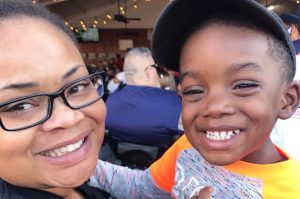
By: Dr. Gail C. Christopher
Just days after Atatiana Jefferson was shot in her home by a white police officer, a diverse group of civic and community leaders convened for two days of workshops on facilitating racial healing in their communities. Participants were taught methods that can increase capacity for empathy and understanding during “healing circles,” gatherings that create environments where sincere, truthful engagements connect neighbors regardless of their race, ethnicity, religion or sexual preference.
Sponsored by the Embrey Family Foundation Oct. 14 -16, the workshops had been scheduled long in advance. But the Oct. 12 shooting in Fort Worth underscored the need for racial healing and the perils that people of color face in a society where their race or ethnicity can elicit fear and antagonism from law enforcement, a scenario that too often results in the senseless death of an innocent person.
As a facilitator for the workshops, I found more than raging anger from yet another police shooting. The voices we heard were determined to find a path forward, an eagerness to deescalate stress and tension with neighbors and create lasting change. Many white participants wanted to be more than mere allies in the racial healing process, they were proud to be considered as equal partners, standing side-by-side with their brothers and sisters.
Healing circles, which are a major component of the #RxRacialHealing movement, allow individuals to come together and share their truths, history, and stories. The circles help a diverse group realize that there are always more factors that unite neighbors and communities than divide them, and the interactions are a platform for discovering, respecting and honoring the unique experiences of each participant. The process enhances the ability of individuals to appreciate the perspectives of others.
At the workshops, Dallas leaders learned to convene healing circles and lead the process that can inspire participants to share truthfully, and from the heart. The goal is to have multiple Dallas communities committed to truth-telling and deep sharing that builds trust, and a more constructive environment to increase equity and fairness while narrowing our divides. At times, these experiences are transformational for participants as they gain insight into their common humanity and conscious and unconscious biases are revealed. The healing circles raise awareness and empathy among those who participate.
It will all be needed. The pathway for racial healing in Dallas, as well as the nation, is to jettison the belief in a hierarchy of human value, the acceptance of superiority based on race, physical characteristics or place of origin that for centuries has fueled racism and conscious and unconscious bias throughout American culture.
Some scholars argue that racism and discrimination should be defined exclusively as behavioral problems that can be resolved by erecting goals, policies, and practices that directly redress the behavior that results in negative outcomes for people of color. Arrest rates among people of color are excessive compared to whites, so stop racial profiling and reduce arrests. More blacks than whites are shot by police officers, enact more restrictive policies on when police can draw their guns. Blacks are disproportionately ticketed for speeding, better define what brings a speeding ticket. All these examples could reign in the behavior of police towards blacks.
But these actions alone won’t go to the root cause of their behavior. The core problem is their consciousness, which is shaped by feelings and beliefs and drives behavior.
Our reaction to another human being is grounded by perceptions and feelings, and what we believe about that other person. If one’s belief system, consciously and unconsciously, sees another person as less than them, then guided by their fears and prejudices that person will act in a biased manner. Particularly in moments of stress, such as policing encounters. That’s when the most deeply held biases will instinctively surface.
America consistently deals with symptoms and consequences of the hierarchy of human value but has yet to successfully confront and eliminate the belief itself.
Numerous times the nation has tried to restrict racist behavior with statutes and court rulings ranging from Brown v. Board of Education to the Civil Rights Act of 1964 to the Fair Housing Act of 1968 that technically made public discrimination against the law. The reality, however, is that the government and courts are limited in scope and reach. They haven’t changed hearts, minds and souls – new laws and statutes didn’t bring racial healing to communities or repudiate the belief in a hierarchy of human value. In Dallas, and across the country, the legacy of racism continues to limit opportunities for children, families, and communities.
That’s why the teachings at the workshops are so important. We worked with a large group, teaming with the Dallas Truth, Racial Healing, and Transformation effort, which wants to lead healing circles with their neighbors to help end the belief in the hierarchy of human value and replace it with the capacity to see ourselves in one another and transform the structural and systematic manifestations of this devastating belief, which must come to an end.
#RxRacialHealing is the catalyst. Our nation aspires to be a place where all children can thrive and equal value of all human beings is the foundation for our society. With healing circles spreading from Dallas, throughout Texas, and across the country, we can lead a transformation that embraces our interconnected humanity and heals the root cause of racism. Together, we can change attitudes and beliefs. #RxRacialHealing can lead the way.
